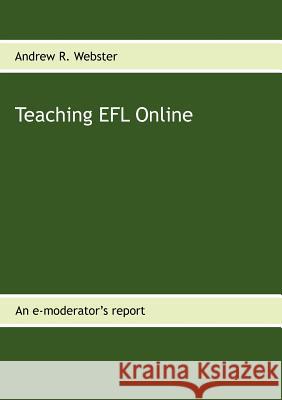Teaching EFL Online: An e-moderator's report » książka
Teaching EFL Online: An e-moderator's report
ISBN-13: 9783848209422 / Angielski / Miękka / 2012 / 122 str.
Teaching EFL Online: An e-moderator's report
ISBN-13: 9783848209422 / Angielski / Miękka / 2012 / 122 str.
(netto: 77,62 VAT: 5%)
Najniższa cena z 30 dni: 76,77 zł
ok. 16-18 dni roboczych.
Darmowa dostawa!
This work explores the role of the e-moderator, taking account of the skills required and the processes involved in creating and teaching an online English as a Foreign Language (EFL) course. It also details those theories which are applicable to online learning and how they are represented through various models, thus creating a framework to assist the e-moderation process. In particular, Salmon's five-stage model (2004) is analysed to assess its effectiveness in helping to prepare a new e-moderator to teach in an online environment. Qualitative self-study research is conducted involving an analysis of the e-moderator's reflective journal. This method can be particularly insightful, uncovering the e-moderator's beliefs, perceptions and challenges encountered throughout the process. Thus, in-depth data is collected and used in evaluating an approach to e-moderation. It reveals how Salmon's five-stage model and others can be considerably helpful, although not sufficient in themselves, for successful online teaching and learning. In this regard, a critical appraisal and detailed analysis of Salmon's model relating to this research is conducted to assess the skills required to become a successful e-moderator. This research reveals not only the complexities, problems, responsibilities and challenges encountered but also the tremendous rewards that can be reaped from the e-moderation process. Such research can encouragingly provide other practitioners with a valuable insight into the process and leads to recommendations for further research. In conclusion, it is apparent that systematic frameworks such as Salmon's five-stage model can be extremely useful for effective scaffolding but on their own they are not sufficient to produce a successful e-moderation process. It is suggested, therefore, that additional support and continual encouragement should be provided to motivate and engage students in both synchronous and asynchronous interactions. Moreover, consideration











